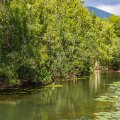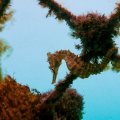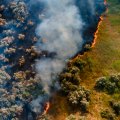The University of Queensland’s (UQ) technical expertise and cutting-edge research in unconventional gas resources, like coal seam gas, has attracted the attention of the single largest importer of liquefied natural gas in the world.
The Korea Gas Corporation (KOGAS) will today sign a five-year agreement with UQ to foster research collaboration and for UQ to provide employee training and consultancy services in advanced coal seam gas technology.
UQ Deputy Vice Chancellor (Research), Professor Max Lu, said the Memorandum of Understanding would further enhance the University’s extensive research activities in coal seam gas extraction conducted by UQ’s Schools of Chemical Engineering and Earth Sciences.
“This agreement with KOGAS recognises that UQ has international expertise in unconventional gas, both upstream resource exploitation and in downstream liquefied natural gas processing,” Prof Lu said.
“UQ is in a strong position to provide industry with new insights and ideas for better utilising gas reserves and developing new technologies and this agreement will pave the way for further research and development in coal seam and shale gas,” Professor Lu said.
KOGAS Research and Development Division director and vice-president, Dr Kim Young-Doo, said the corporation believed the agreement would enhance the corporation’s current research and development program in sustainable energy systems.
“We are confident that the collaboration between KOGAS and UQ will provide fruitful outcomes for many years,” Dr Young-Doo said.
“The agreement will provide cooperative research opportunities in developing clean energy and will give KOGAS staff access to world’s best practice training in advanced coal seam gas technology.”
Head of the UQ School of Chemical Engineering, Professor Paul Lant, said the agreement would make Queensland, which is already a world leader in coal seam gas production expertise, an international hub for research and development of new technologies.
“We have conducted some of the world’s most extensive research into understanding the way fluids flow through coal seams and their dynamic influence on coal reservoir properties,” Professor Lant said.
UQ is currently heading up a number of projects to better understand the dynamics of coal seam gas reserves and increase the efficiency of methane extraction from coal. These include using carbon dioxide or flue gas to drive out more methane from the coal seam or using microbes to manufacture more methane from the coal itself.
The key UQ experts in coal seam gas technology who will work with KOGAS are Professor Joan Esterle, Professor Sue Golding, Professor Victor Rudolph and Dr Paul Massarotto.
Media: Professor Victor Rudolph (07 3365 4171 or v.rudolph@uq.edu.au) or Kathy Grube from UQ communications (03 3346 0561 or k.grube@uq.edu.au)
.jpg)










